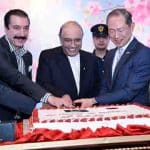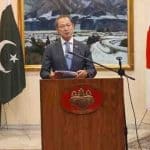ISLAMABAD – Prime Minister on Monday urged religious scholars to play their due role in Pakistan’s intellectual revolution by spreading mass awareness about cleanliness, righteousness and national unity to make the country a great nation.
Addressing the Ulema and Mashaikh conference here, the Prime Minister said that Pakistan as a country had drifted quite far from the ideals on which it was made. He said the scholars had an important role in its course correction and “bringing us back to that path”.
“I am talking about an intellectual revolution in the country and Imran Khan alone can’t do anything if you don’t become part of this struggle and effort”, said the Prime Minister.
He called upon the participants to act on his agenda because they had a voice that has access to and impact on the public.
He said the project of making Pakistan like the state of Madina was a struggle primarily in “character building” and correcting the values.
The premier firstly asked the Ulema to elaborate and explain the principles of the state of Madina to the people wherever they get the opportunity to do so.
“There is a reason why the Holy Quran says to learn from him,” said the premier, referring to Prophet Muhammad (PBUH).
The prime minister also extolled the importance of public cleanliness and hygiene as part of his agenda to the Ulema.
He said cleanliness was a mindset and not something which could be tackled by merely channelling more money into it.
“Make the people understand that when the Holy Prophet said cleanliness is half of faith, there was a reason for that”, he emphasised.
He said there were important lessons to learn because a nation with no status soon came to assume “leadership of the world” and defeated two superpowers of the time. “No one still understands how such a big revolution came about.”
The Prime Minister said ensuring all the basic rights to every citizen and rule of law were the two main principles of the State of Madina.
Referring to the growth in the Scandinavian countries, he said these countries acted upon the principles practiced in the State of Madina, but we lagged behind for not paying due attention to them.
Imran Khan said corruption is another important issue on which the Ulema should educate people to make this menace unacceptable in the society.
“Making a law won’t matter when Ulema don’t give the message to the people that this corruption is bad,” said the premier and thus called upon the scholars to actively play their role in teaching people to differentiate between right and wrong.
The Prime Minister said religious scholars have a pivotal role in building Pakistan as an Islamic welfare state as envisioned by the Quaid-e-Azam Muhammad Ali Jinnah.
The prime minister further said it was unfortunate that the difference between right and wrong was becoming muddled for people in the country. “A nation dies when it fails to differentiate between the good and the bad.”
He said prominent journalists had gone to court, seeking permission for speeches to be aired of an individual who was convicted by the Supreme Court and fled the country after allegedly lying, apparently referring to PML-N supremo Nawaz Sharif.
He lamented that these actions sent conflicting messages to the youth, adding that he wanted to create a society where people would fear taking bribes.
He called upon the Ulema to give importance to the values of truth and honesty “wherever you talk”. “We need to do a battle for honesty because unfortunately I’m saddened that we have gone far away from this which is a big value of Islam.”
He stressed that creating unity to strengthen the country was a “big responsibility” for the Ulema since the Prophet had successfully united people and warring tribes into a nation.
“God has blessed this country and it is our misfortune that we couldn’t make this country the nation it should have been,” said the prime minister.
Imran Khan said unfortunately Islam was linked to terrorism in the West. He said Islam has nothing to do with extremism or terrorism, but it is a religion of peace.
He said he has emphatically spoken against Islamophobia at international forums, including the United Nations and the OIC, and will continue raising voice in this regard.
The prime minister concluded his remarks by reminding the audience to play their role in building unity among the people.
He said incidents of division such as people picking up guns against each other or hurling accusations of blasphemy were “big impediments to making us a great nation”.
Follow the PNI Facebook page for the latest news and updates.









